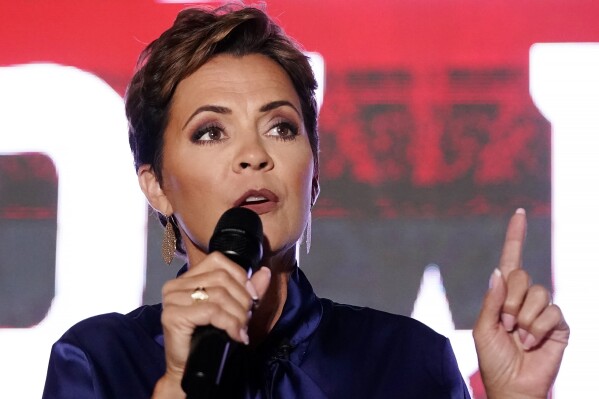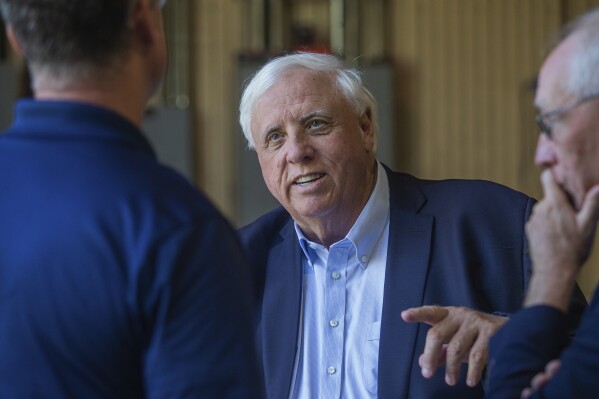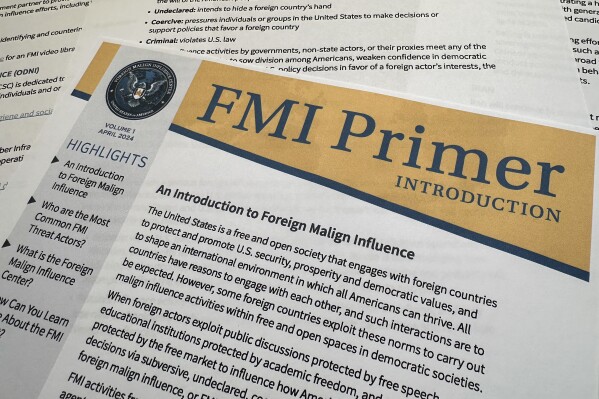At the Sky News leaders' event, both Sir Keir Starmer and Rishi Sunak were challenged on their records in opposition and in office, as well as their plans for the future – and both at times struggled to explain away failures and omissions.
Sir Keir went first and found himself challenged over his previous support for Jeremy Corbyn, which the Conservatives see as an opportunity, given the efforts he has made to distance his Labour Party from the now-expelled former leader.
His campaign to replace Mr Corbyn in 2020 was also brought up by interviewer Beth Rigby, who said the Labour leader had ditched "six or seven" of the pledges he described at the time as "the moral case for socialism".
A quick check of the scorecard shows Rigby was right.
Sir Keir's promise to increase income tax for the top 5% of earners has been ditched, as has a promise to "support the abolition of tuition fees", while a commitment to abolish Universal Credit has become "fundamental reform".
Follow the latest on the general election
The promised 'Green New Deal' survives but has been dramatically scaled back from £28bn a year to £23bn over five. And a red pen has gone through nationalising "rail, mail, energy and water".
Only railways will return to public ownership, with Sir Keir arguing that in the case of energy companies, the price of buying out shareholders was too high.
A significant indicator of what Sir Keir might do in the future was what he said - and importantly, did not say - on tax.
The Labour leader repeated his position that he would not "raise taxes for working people", ruling out increasing income tax, national insurance and VAT. But under questioning, he repeatedly refused to rule out other potential tax rises, including capital gains tax (CGT).
More from Sky News:
Starmer shares 'worry' for his family
Who won the leaders' event? Viewers' pick revealed
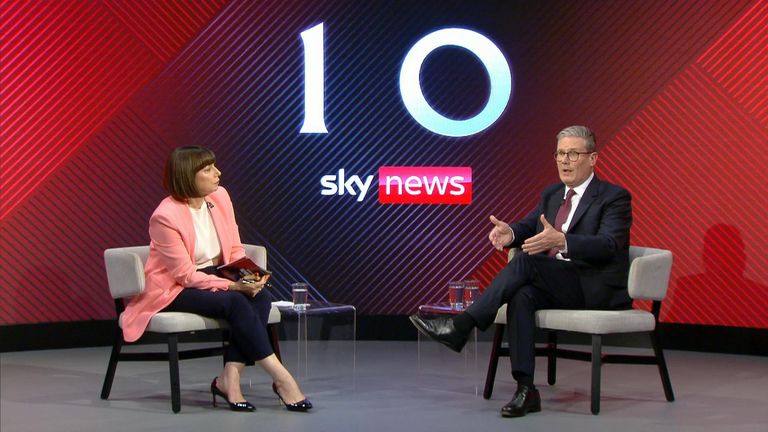
CGT is paid on capital gains, predominantly from the sale of assets, at rates between 10% and 28%. These rates are much lower than income tax, which starts at 20% and rises to 45% - meaning the asset-rich living off gains can pay less tax than a nurse.
The Office for Budget Responsibility forecasts CGT will raise £15.2bn this year, rising to £23.5bn in 2028-29, but University of Warwick research has estimated equalising CGT rates with income tax could raise a further £16.9bn annually.
Sir Keir's determination not to commit suggests a CGT raise remains firmly on the table when, and if, Rachel Reeves writes her first budget.
If it is introduced, she would not be the first new chancellor of the exchequer to raise taxes immediately after an election.
Resolution Foundation research shows, since 1992, every chancellor but one has raised taxes in their first two fiscal events after polling day by an average of £21bn.
Has Rishi Sunak delivered on his pledges?
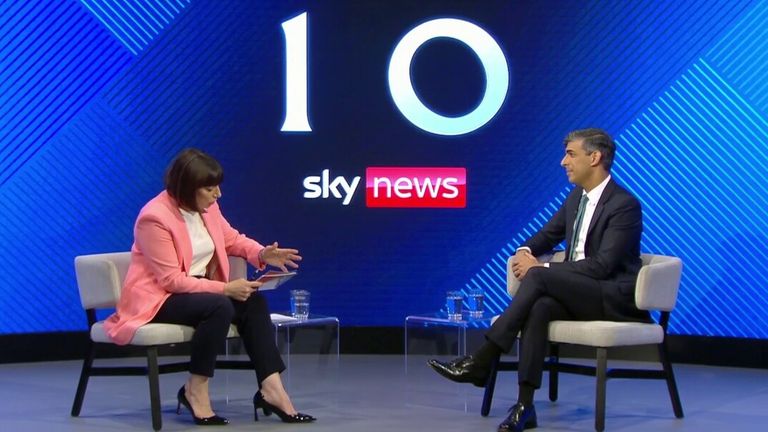
If the challenge for Sir Keir is what he might do in office, the problem for Mr Sunak is what he has done.
Being prime minister of a party that's been in power for 14 years leaves nowhere to hide, and Mr Sunak put a target on his back by setting five very specific pledges on which he can be judged back in January last year.
He promised to halve inflation, grow the economy, get debt falling, reduce NHS waiting lists and "stop the boats" by the year's end.
On only one count, inflation, can he unambiguously be said to have succeeded, and his influence over even that is contested ground.
Inflation did fall from 11% to less than half that, and is currently 2.6%, but global factors, specifically falling energy prices, and the action of central banks were more influential than his decisions not to stoke domestic inflation.
Mr Sunak told Rigby inflation was now "back to normal" but that applies only to the rate of increase in prices, rather than the impact on costs.
Seen through that lens, prices are now around 20% higher than they were before the war in Ukraine, a new "normal" few people relish.
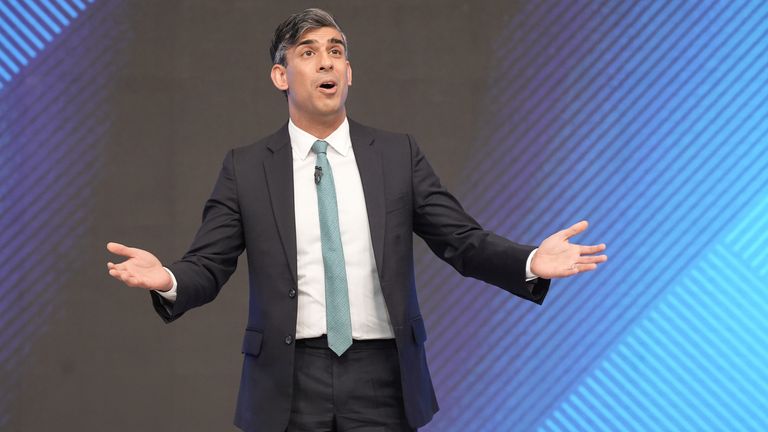
On growth, Mr Sunak was never explicit about which measure he would use. Growth in the final quarter of 2023 was down 0.3% on the previous one, but overall growth for the year was up by 0.1% - the narrowest of margins, but enough to claim success.
The rest of the list makes grim reading for the prime minister. Debt is not falling, though it is forecast to come down in five years, the measure that both Conservatives and Labour use to set their fiscal rules.
The NHS and immigration were even tougher areas for the PM, the statistical scorecard meshing with the lived reality of people experiencing under-pressure public services.
Waiting lists have risen dramatically, up to a peak of 7.4 million before falling back a little in the last few months. Unlike in the first TV debate, Mr Sunak did not try to argue that a small reduction amounted to a win.
On small boats he was more combative but on no measure can he be said to have stopped the crossings. In 2023, there were around 15,000 fewer crossings than in the year before. But this year to date, they're up.
The broader immigration picture is also problematic. Every Conservative prime minister from Cameron to Truss promised to cut net migration to the tens of thousands and failed.
Mr Sunak set no target but has overseen the highest ever figure, more than 800,000 people last year, a number that appeared to stick with the audience in Grimsby.
Net migration is falling on the latest figures, and fewer visas are being granted after rules were tightened on the dependants of students and care workers, and salary thresholds for skilled workers increased.
Disclaimer: The copyright of this article belongs to the original author. Reposting this article is solely for the purpose of information dissemination and does not constitute any investment advice. If there is any infringement, please contact us immediately. We will make corrections or deletions as necessary. Thank you.
